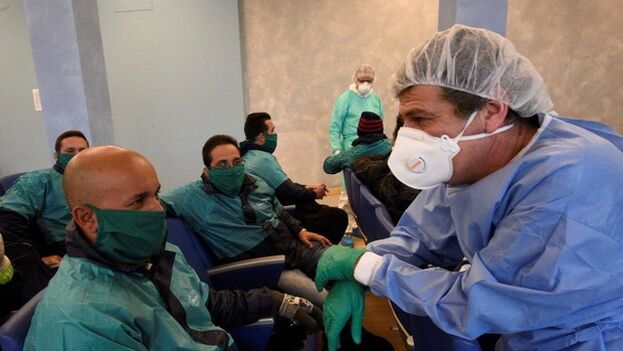
![]() 14ymedio, Havana, 25 September 2020 — Cuban doctors residing in Spain have been mobilizing since last Wednesday to alert politicians to the shortage of healthcare workers in the country. The Government of the Community of Madrid, within the package of measures that it is presenting this week due to the severe outbreak of coronavirus that affects the region, has asked the National Executive to authorize the urgent hiring of 300 non-European doctors.
14ymedio, Havana, 25 September 2020 — Cuban doctors residing in Spain have been mobilizing since last Wednesday to alert politicians to the shortage of healthcare workers in the country. The Government of the Community of Madrid, within the package of measures that it is presenting this week due to the severe outbreak of coronavirus that affects the region, has asked the National Executive to authorize the urgent hiring of 300 non-European doctors.
Cuban health workers have seen the opportunity to be able to practice in Spain open up again, and a petition is again circulating on change.org, with almost 32,500 signatures, in which they demand the confirmation of the qualifications of the more than 3,000 doctors of different nationalities who have been in this situation for between 9 and 24 months.
“While the political class does not stop repeating the mantra that there is a lack of doctors in Spain — especially in primary care in most communities, with Madrid in the spotlight — thousands of doctors wait for their medical degrees to be approved as has been done in other countries,” says the text.
As of April, the Ministry of Universities of Spain had approved the qualifications of 134 Cubans, 82 of them during the state of alarm, which came into force on March 15, 2020, according to the department statistics provided to 14ymedio. The current petition notes that this extraordinary regularization allowed the hiring of 200 doctors in the first wave of Covid-19 and calls for a similar action.
The demands of the Cubans are far from the scenario handled by the Spanish authorities. In the first wave of the pandemic, the central government — which temporarily assumed command of Healthcare, an autonomous competence in Spain — allowed the hiring of non-EU personnel urgently as the usual requirements were abolished. The Madrid government demands a similar action now, but, if approved, it would allow, as happened in March, that at the end of the contract the doctors would return to their current status: their qualifictions would not be recognized, and they would again be prohibited from exercising their profession.
The Cuban doctors believe that the crisis has revealed the need for Spain to have their support, given the serious situation facing the Community of Madrid (with an incidence of almost 700 cases per 100,000 inhabitants, tripling the national average).
Last Monday, the regional and national governments formed a coordination committee that agrees on measures between the state and the region to try to stop the outbreak. Among those that are already in force is the limitation of mobility and reduction of capacity and business hours within neighborhoods with a high incidence of infections.
However, one of the Achilles heels of healthcare in Madrid is the lack of medical professionals, a fact that has hampered its return to normality due to the lack of tracking capacity and personnel shortage in primary care. The decision on the possible temporary hiring of non-EU citizens will be taken on Monday 28, as announced on Friday by Salvador Illa, Minister of Health.
The issue of hiring has led to conflicts between the regional government, which argues limitations in access to the medical career, and the opposition, which accuses the Executive of making precarious contracts that lead doctors to leave to other communities or to go abroad.
Earlier this year, an opposition bill was rejected in the Madrid Assembly to allow non-EU workers to enter the Madrid Health System. If the vote had gone ahead, the nationality requirement – Spanish or of any European country – required to work as a public official would have been eliminated and the doctors could work in the national health system. Currently, they can only do it privately as long as their titles are approved.
Now, the opposition reproaches the regional government for saying that there is a shortage of doctors when just a few months ago it overturned a measure that would have opened the door to foreigners, a measure that it is in force in some autonomous communities such as Castilla y León, Asturias, Extremadura and the Valencian Community.
At the expense of what may happen in the next few days, thousands of Cubans have their eyes on the decisions that both governments may make.
____________
COLLABORATE WITH OUR WORK: The 14ymedio team is committed to practicing serious journalism that reflects Cuba’s reality in all its depth. Thank you for joining us on this long journey. We invite you to continue supporting us by becoming a member of 14ymedio now. Together we can continue transforming journalism in Cuba.
